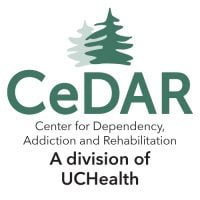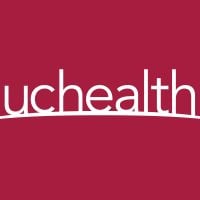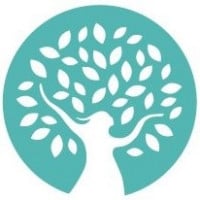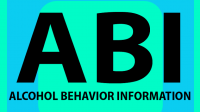CeDAR at University of Colorado Hospital
Drug Rehab Center in Aurora, Colorado
CeDAR at University of Colorado Hospital is a comprehensive addiction treatment facility in Aurora, CO offering various levels of care for individuals suffering from alcoholism, opioid addiction, substance abuse, or drug addiction, with a highly experienced team of medical and clinical professionals accredited by JCAHO and LegitScript.
About This Aurora, CO Facility
CeDAR – Center for Dependency, Addiction and Rehabilitation, UCHealth's premier addiction treatment facility in Aurora, Colorado, provides innovative, evidence-based programs to save lives and establish a meaningful foundation for long-term recovery.
This facility's mission focuses on delivering cutting-edge, research-backed treatments to help individuals overcome addiction and achieve lasting sobriety. CeDAR's commitment to excellence ensures patients receive the highest quality care.
Accredited by JCAHO and LegitScript, CeDAR offers a comprehensive range of services, including detoxification, inpatient and outpatient care, partial hospitalization, and residential treatment. Their holistic approach addresses various addictions, such as alcoholism, opioid dependence, substance abuse, and dual diagnosis.
- Personalized treatment plans tailored to individual needs
- Multidisciplinary team of addiction specialists
- Aftercare support for sustained recovery
- Family education and counseling services
CeDAR specializes in treating alcoholism, opioid addiction, substance abuse disorders, dual diagnosis conditions, and drug addictions. Their expertise lies in addressing the complex challenges associated with these issues.
For individuals struggling with opioid dependence, CeDAR provides a safe, medically-supervised detoxification process, followed by comprehensive rehabilitation programs. Their multidisciplinary team works closely with patients to develop personalized treatment plans, incorporating evidence-based therapies, counseling, and support services.
Genders
Ages
Modality
Additional
Accreditations

LegitScript

JCAHO
Conditions and Issues Treated
Using both legal medications and illegal substances in order to maintain an addiction is substance abuse. Illegal substances can become addictive after a single use. If you are obtaining legal medications illegally, you may be suffering from substance abuse.
Fortunately facilities like CeDAR at University of Colorado Hospital in Aurora, CO are here to help.
Opioid addiction treatment facilities in Colorado, like CeDAR at University of Colorado Hospital cover both illegal and prescription opioids abuse. Most plans include detoxification and subsequent medications to ease the process. Behavioral therapies and counseling are also necessary to resolve the root cause of addiction.
When someone in Colorado struggles with both addiction and mental or emotional illness, this is considered a dual diagnosis. Dual diagnosis treatment can include emotional trauma, bipolar disorder, schizophrenia, depression. Getting treatment for these issues must occur at the same time to treat either of them effectively.
Levels of Care Offered
This center offers a variety of custom treatment tailored to individual recovery. Currently available are Aftercare Support, Detox, Drug Rehab, Dual-Diagnosis, Inpatient, Intensive Outpatient, Outpatient, Partial-Hospitalization, Residential, with additional therapies available as listed below.
A detox program helps the person physically withdraw from drugs and helps them track their progress. So, suppose the person isn’t ready for sobriety (or relapses). In that case, the treatment professionals can catch it early and help re-orient them towards recovery.
In order to focus on the psychological aspects of addiction, one must first address the physical symptoms of withdrawal.
Withdrawal symptoms can be painful, even fatal, so managing the detox process carefully is critical. Severe withdrawal symptoms are often treated with more advanced pharmaceutical interventions. Nausea and headaches are common side effects of detoxification.
Inpatient rehabilitation aims to treat severe addictions and co-occurring disorders. Depending on individual requirements, the duration of the stay at CeDAR at University of Colorado Hospital ranges from four weeks to six months. Colorado inpatient recovery guarantees that the patient resides in an environment free of drugs.
An intensive outpatient treatment program is set up for those struggling with an addiction to begin the recovery process. Patients come to Aurora, CO to CeDAR at University of Colorado Hospital for therapy, support, programs, and medical supervision. Intensive outpatient treatment is often very tightly scheduled and heavily structured.
Partial Hospitalization Programs (PHP) are meant for individuals experiencing trouble functioning at school or with work and other occupations, medical instability, inadequate support at home, simultaneous mental health issues, and substance use disorders in Colorado. They are also meant for those experiencing the risk of self-harm or the urge to harm others. It is a short-term treatment program offered at CeDAR at University of Colorado Hospital, aiming to improve individuals enough to be reassigned to a lower level of care. The program operates within a psychiatric hospital for several hours daily, usually three to five days per week.
Residential treatment programs are those that offer housing and meals in addition to substance abuse treatment. Rehab facilities that offer residential treatment allow patients to focus solely on recovery, in an environment totally separate from their lives. Some rehab centers specialize in short-term residential treatment (a few days to a week or two), while others solely provide treatment on a long-term basis (several weeks to months). Some offer both, and tailor treatment to the patient’s individual requirements.
Treatment for substance abuse does not cease after an individual successfully completes a detox or rehabilitation program. A vital follow-up treatment service is aftercare support provided to individuals at CeDAR at University of Colorado Hospital in Colorado after they attain initial sobriety.
Aftercare support often takes the following forms: 12-Step Programs, Outpatient Treatment Programs, and Support Groups. The most effective aftercare programs are tailored to meet an individual’s specific needs and circumstances.
CeDAR at University of Colorado Hospital‘s Therapies & Programs
Spousal relationships bear the brunt of alcohol and drug dependence. It becomes critical to submit the relationship to couples therapy to prevent straining it further. Some facilities like CeDAR at University of Colorado Hospital in Aurora, CO offer couples therapy options to manage intimate partnerships amid the recovery process. Other couples-focused treatment plans can provide the patient and their partner tools to get things back to normal.
When family members are more proactive and involved in the treatment procedure, it encourages the patient to advance his or her progress. Moreover, it shouldn’t be ignored that genetics play a role when it comes to addiction, so it’s better to approach the problem as a unit. Also, with proper education, family members can help an individual avoid addiction triggers and guide him or her in making lifestyle changes necessary for his or her sobriety.
It has been said that unhealed trauma is the root of most addictions. Trauma therapy is a way of addressing trauma while in a safe situation in order to heal. Healing past traumas and introducing coping strategies are strong foundations for sustained recovery from addiction. This may involve individual or group counseling or both, in a Aurora, CO facility. Other forms of therapy have been proven to assist in healing past traumas.
Dialectical Behavior Therapy (DBT) helps those who attend CeDAR at University of Colorado Hospital understand how their feelings, beliefs, and thoughts affect their behaviors. DBT is particularly useful for people with self-harming behaviors, as well as those with substance abuse disorders. DBT teaches people how to tolerate distress, regulate their emotions, and how to become mindful.
Cognitive Behavioral Therapy (CBT) is a type of psychotherapy that focuses on the underlying thoughts and behaviors that caused the problem of addiction in the first place and may cause a relapse. Negative feelings are common in substance abuse disorders, and if not recognized, they can cause co-occurring disorders.
CBT involves strategies that help to change the thinking and behavioral pattern by cognitive restructuring. In simple terms, it helps to remove negative thoughts and provides long-term benefits. Also, CBT promotes self-awareness, self-control, and healthy ways to respond to negative thoughts. It can be administered as a mono-therapy as well as a part of combination therapy.
The 12-step program is a part of substance abuse treatment. In this program, peers help each other to achieve the goal of abstinence. It was initially developed by the founders of Alcoholics Anonymous. Due to its huge success, the 12-step program is included as a part of other substance abuse treatments.
The 12 steps guide at an individual level. It begins with the individuals accepting that they are addicts, and they understand its consequences. It is followed by focusing on the recovery process and making amends for hurting others. The program provides the benefit of cognitive restructuring, which refers to the process of change in the negative thoughts that leads to long-term benefits.
Payment Options Accepted
For specific insurance or payment methods please contact us.
Is your insurance accepted?
Ask an expert, call (888) 674-0062
CeDAR Associated Centers
Discover treatment facilities under the same provider.
Learn More About CeDAR Centers
Additional Details
Specifics, location, and helpful extra information.
Aurora, Colorado 80045 Phone Number(877) 345-8981 Meta DetailsUpdated April 15, 2024
Staff Verified
Is CeDAR at University of Colorado Hospital a LegitScript Verified Treatment Facility?
According to our most recent records, we have found this center to be LegitScript verified.
Patient Reviews
There are no reviews yet. Be the first one to write one.
Aurora, Colorado Addiction Information
The Centennial State has slipped to a ranking of 12th in the country for drug abuse. Each year around 24% of the state's population uses illegal drugs while nearly 5% of its population abuses alcohol. Substance-related deaths in Colorado were responsible for 15.12% between 2008 and 2017. Fortunately, Colorado drug and alcohol addiction treatment are available to help a person overcome addiction.
The drug addiction problem in Aurora, CO is severe. The number of opioid-related deaths in the area quadrupled from 2013 to 2017. It's estimated that there are over 2,000 drug overdoses in Aurora each year. Many addiction treatment centers will offer a variety of therapies and treatments, such as group therapy, individual therapy, family therapy, medication-assisted treatment, and holistic therapies.
Treatment in Nearby Cities
- Windsor, CO (50.9 mi.)
- Johnstown, CO (41.2 mi.)
- Buena Vista, CO (92.8 mi.)
- Wheat Ridge, CO (12.4 mi.)
- Rifle, CO (157.1 mi.)
Centers near CeDAR at University of Colorado Hospital
The facility name, logo and brand are the property and registered trademarks of CeDAR at University of Colorado Hospital, and are being used for identification and informational purposes only. Use of these names, logos and brands shall not imply endorsement. RehabNow.org is not affiliated with or sponsored by CeDAR at University of Colorado Hospital.








